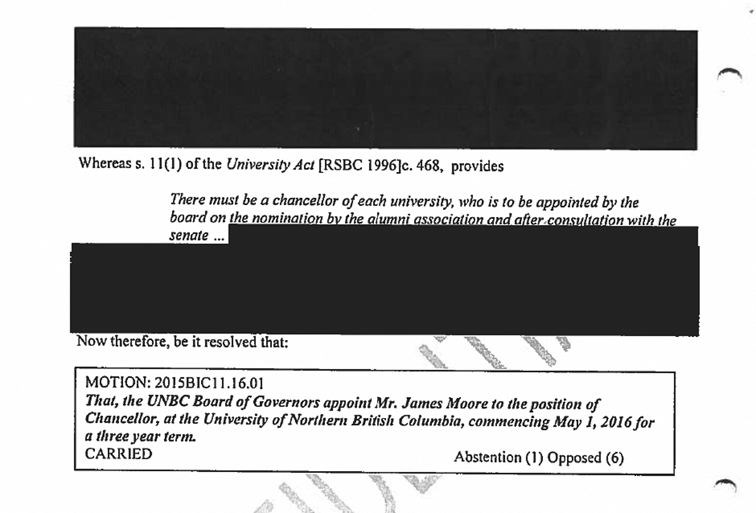When it came down to voting James Moore in as the University of Northern B.C.'s next chancellor, its board of governors almost ended up with a split vote.
In November, the 14-member board narrowly approved the former cabinet minister by a vote of one. Six members were opposed and one abstained from voting, according to a package released to the university senate last week, a scan of which was forwarded to The Citizen.
"The only revealing thing for us was that the board itself was split down the middle," said Michael Murphy, a political science associate professor and Canada Research Chair, who also sits on the university's senate.
"The actual board vote seemed to be a lot closer than what the board chair has been insinuating," added associate professor Paul Siakaluk, another senator who has been outspoken about Moore as an unfit figurehead. "We didn't learn too much more than what we already knew."
The document will be made publicly available by the university, but its version with "rationale for redactions," is not yet ready, said communications manager Matt Wood.
Some of the blacked-out sections in the 52-page document relates to items discussed in-camera, but others are listed under public sessions and in emails.
Despite chair Ryan Matheson's lengthy email to the faculty last Friday defending the board's decision and Moore as a strong candidate, Murphy said there are still concerns with the process and timing around Moore's appointment.
In particular, Murphy questions Matheson's statement that "(w)hile the official nomination period closed in January 2015, the Chancellor Advisory Task Force was able to consider nominations after that date, even up until late summer."
"If that process was not followed, it would be disturbing on the one hand," said Murphy, adding the senate is still waiting on more documents from the university.
Murphy has compiled a number of questions: "Was James Moore on the initial list? If not how did his name come forward? What was the process followed? Who was involved? Who created the process, that sort of thing."
This is another issue over and above the previously voiced concern by the senate that it was not consulted.
"(The board) basically just informed us that this was their choice and really... we were not going to have any ability to change their minds."
Two university associations - the Canadian Association of University Teachers and the Confederation of University Faculty Associations of British Columbia - have called on Advanced Education Minister Andrew Wilkinson to investigation the board's approach to Moore's appointment.
Matheson listed Moore's many accomplishments when he explained the board's decision not to reverse the appointment, including Moore's support of several research and education initiatives but Murphy said that does not address a larger failure on the part of the former Conservative government.
"We can simply not abide the fact that Mr. Moore stood by while federal scientists were muzzled, when they were not permitted to communicate their information freely to the Canadian public," he said.
"Maybe he's good at fundraising... are we going to throw away our principles for a good fundraiser? I don't think we need to."
Siakaluk acknowledged it's unlikely the board will change its mind and instead turns his attention to UNBC's sixth chancellor.
"At this point really it's up ultimately to Mr. Moore to realize that from the board downward this is a divisive decision and chancellors should not be divisive decisions."
Even as some say it's time to move on because the board has made its final decision, Siakaluk said it's not as simple as that.
"Just to remain quiet is to implicitly say it's OK. And it's not," he said. "We believe pursuit of knowledge, expression, the ability to investigate or research what you want are all important pillars in how universities work.
"We'll keep fighting for those principles."



